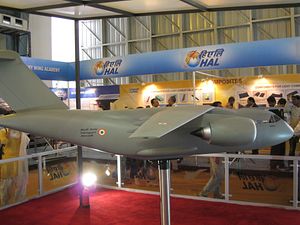India and Russia decided to terminate a bilateral defense program to develop and produce a new medium-airlift military transport aircraft for the Indian and Russian air forces, according to a senior Russian official.
Russia’s Minister for Industry and Trade, Denis Manturov, was quoted by TASS news agency on March 24, as saying that India and Russia failed to find a solution beneficial to both countries. “Not all projects yield results,” the minister said. “During the execution of the project, which lasted five years, we did not manage to find such a solution that would be beneficial for the two countries.”
He was quick to add that “this does not mean that the relations have been broken off.”
The so-called Multi-role Transport Aircraft (MTA) program — an Indo-Russian joint venture for which Russia’s United Aircraft Corporation (UAC) and India’s Hindustan Aeronautics Ltd. (HAL) co-founded a new company, Multi Role Transport Aircraft Ltd. — aimed to co-develop and produce a new transport plane, the UAC/HAL II-214 Multi-role Transport Aircraft by 2019. Both countries earmarked $300 million each for the first phase of the project.
In May 2012, both countries signed a general contract for the co-development of the aircraft. India intended to acquire up to 45 aircraft, Russia around 100 new transport planes. However, both sides were unable to agree on a detailed design of the new transport plane and the project stalled. One of the major stumbling blocks was the Russian selection of the engine for the aircraft. Another reason was coordination difficulties within the Russian design team.
As I reported in January 2016:
The Indian Air Force is not happy with the selection of the PD-14M turbofan engines and other technical decisions taken by Russian engineers. (Most importantly, India wants the MTA to operate in higher altitudes than the current technical configuration would allow.) The Russian side also wants to increase the program development budget, something that India vehemently opposes.
Furthermore, the Indian Air Force’s fleet of Antonov AN-32 transport aircraft has been undergoing a major midlife upgrade extending their service lives by 25 to 40 years, which reduced the service’s urgency to introduce new transport aircraft. The cost for the upgrade of 104 AN-32 transport aircraft is about $400 million and includes fitting the aircraft with “improved avionics, modernization of the cockpit, and a payload capacity increase from 6.7 to 7.5 ton,” I explained previously.
“The MTA program is as good as dead, and a global tendering will take place,” an unnamed senior Indian Air Force official said in January 2016. Yet, while the recent announcement by Russia’s minister for trade and industry appears to bury the project for good, no Indian defense official has so far publicly confirmed the cancellation of the program. It is also unclear when a new tender will be issued and whether Russia will participate in it.
Last week, Indian Air Chief Marshal B. S. Dhanoa announced that the Ministry of Defense will begin contract negotiations for the purchase of 56 Airbus Defence and Space (DS) C295 medium transport aircraft with European defense contractor Airbus.

































